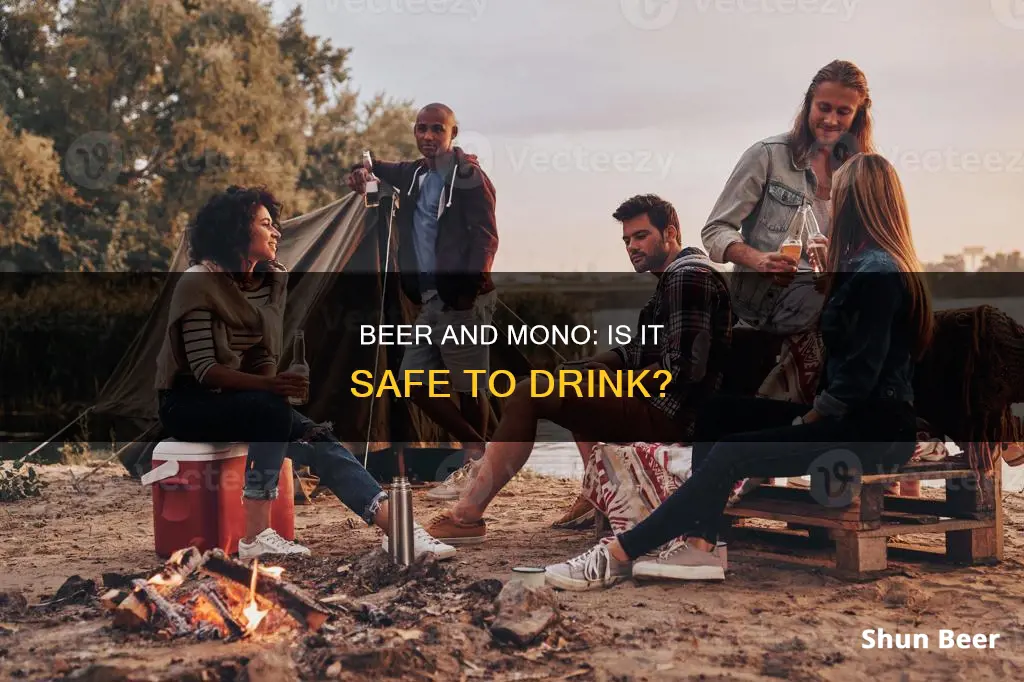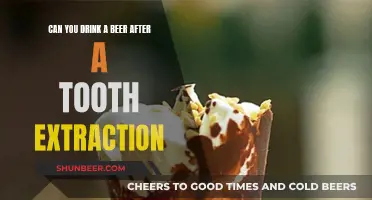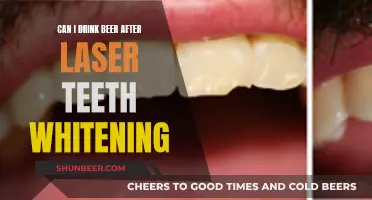
Drinking alcohol can be detrimental to your health, especially if you have mononucleosis, more commonly known as mono. Mono is a viral infection that is common among young people, and it is caused by the Epstein-Barr virus (EBV), which is spread through saliva. Both mono and alcohol affect the liver, and consuming alcohol while having mono can lead to liver damage. Therefore, it is recommended to refrain from drinking alcohol if you are experiencing symptoms of mono and to continue avoiding alcohol for a few months even after you start feeling better.
| Characteristics | Values |
|---|---|
| Should you drink beer if you have mono? | No |
| Why? | Both mono and alcohol affect the liver, so drinking alcohol when you have mono could result in liver damage |
| What should you do if you think you have mono? | See a doctor or visit student health right away and don't drink alcohol |
| How long should you avoid alcohol if you have mono? | For a few months, even after you start feeling better |
What You'll Learn

Drinking alcohol with mono can cause liver damage
Drinking alcohol while having mono can cause liver damage. Mono, or infectious mononucleosis, is a disease caused by the Epstein-Barr virus (EBV) and is commonly known as the "kissing disease" due to its spread through intimate oral contact. While mono typically resolves without specific medical treatment, it can cause fever, sore throat, swollen lymph nodes, and liver inflammation, among other symptoms.
The liver is already affected by mono, and consuming alcohol can further stress and damage this vital organ. Alcohol is metabolized by the liver, and when combined with mono, the risk of liver damage increases significantly. This is because both mono and alcohol independently affect the liver, and their combined impact can be detrimental.
The liver is responsible for filtering toxins from the body, and when infected with mono, it becomes inflamed, a condition known as mono hepatitis. Adding alcohol to this mix can overburden the liver, leading to potential long-term damage. It is crucial to avoid alcohol consumption when experiencing mono symptoms and even for a few months after recovery to ensure the liver has time to heal completely.
Furthermore, mono can cause an enlarged spleen in up to 60% of cases, making it more vulnerable to injury. As the spleen is involved in filtering blood and removing old red blood cells, any additional stress from alcohol can further compromise its function. In extreme cases, an enlarged spleen may rupture, causing sudden and sharp pain in the left upper abdomen, which requires immediate medical attention.
Therefore, it is essential to refrain from alcohol consumption when experiencing mono symptoms and to prioritize liver health during and after recovery.
Afib and Alcohol: Is Drinking Beer Safe?
You may want to see also

Mono is caused by the Epstein-Barr virus (EBV)
Drinking alcohol is not recommended for people with mono, as both mono and alcohol affect the liver, and the combination can lead to liver damage. It is important to note that mono is caused by the Epstein-Barr virus (EBV), a highly contagious virus that spreads primarily through saliva and other bodily fluids. EBV is a type of herpesvirus known as herpesvirus 4, and it can remain dormant in the body indefinitely once contracted.
The Epstein-Barr virus is one of the most common human viruses, with nearly 95% of the world's adult population infected at some point in their lives. While EBV often causes no symptoms, it can lead to mononucleosis, commonly known as mono, in some individuals. Mono is a disease characterised by symptoms such as extreme fatigue, swollen glands in the neck, weak and sore muscles, and an enlarged spleen and liver. These symptoms typically appear 4 to 6 weeks after infection and can last for several weeks or even months.
Although EBV is the most common cause of mono, it is important to note that other viruses can also lead to the condition. Additionally, not everyone infected with EBV will develop mono, as the severity and duration of symptoms seem to be related to certain immune system responses rather than the mere presence of the virus.
Currently, there is no specific treatment for EBV, and symptoms usually clear up on their own within a few weeks with rest, fluids, and over-the-counter medications. However, researchers are investigating potential treatments, such as the drug dipyridamole, which may prevent EBV reactivation in the body.
Drinking Beer on Daytona Beach: What's Allowed?
You may want to see also

Mono is spread through saliva, so it's known as the kissing disease
Drinking alcohol is not recommended for people with mono, as mono and alcohol both affect the liver, and the combination could lead to liver damage. Doctors advise against drinking alcohol for a few months after the symptoms of mono have subsided.
Now, onto mono being known as the "kissing disease".
Mononucleosis, or mono, is a viral infection that causes a sore throat and fever. It is usually caused by the Epstein-Barr virus (EBV) and is spread through contact with saliva. It is most common among teens and young adults. The infection goes away on its own after a few weeks of rest.
Mono is nicknamed "the kissing disease" because it is spread through kissing, as well as through sharing drinks, utensils, toothbrushes, and other items that come into contact with saliva. It can also be spread through coughing, sneezing, blood transfusions, and sexual contact, although these are less common transmission routes.
People infected with mono carry the virus for life, even if they show no symptoms. The virus can become dormant and then reactivate, making them contagious again. Therefore, it is important to maintain good hygiene practices, such as handwashing, and to avoid close contact with infected individuals to prevent the spread of mono.
Great Wolf Lodge: Beer Drinking Rules Explained
You may want to see also

Symptoms of mono include fatigue, fever, headache, and muscle aches
Mononucleosis, or mono, is a contagious infection caused by the Epstein-Barr virus (EBV). It is sometimes called the "kissing disease" because it spreads easily through bodily fluids like saliva. While mono usually goes away on its own without treatment, it can cause a range of symptoms, including fatigue, fever, and muscle aches.
Fatigue is one of the most common and debilitating symptoms of mono, often lasting for several weeks or even months after other symptoms have subsided. People with mono experience extreme tiredness, which can interfere with their daily lives, including school and work. The fatigue is accompanied by body aches and muscle weakness, making it difficult to carry out regular activities.
Fever is another classic symptom of mono, which can be accompanied by chills. The fever may last for several days and then gradually improve, but it can also persist for longer. In some cases, a high fever may indicate a more serious complication, such as a ruptured spleen, which requires immediate medical attention.
In addition to fatigue and fever, mono can cause severe headaches, especially when accompanied by a stiff neck. This may be a sign of meningitis, and medical advice should be sought.
Mono can also cause muscle aches and body aches, which can be managed with pain relievers and fever reducers, such as ibuprofen or acetaminophen. However, it is important to note that mono affects the liver, and drinking alcohol while having mono can lead to liver damage. Therefore, it is recommended to avoid alcohol for a few months, even after the other symptoms have improved.
Mixing Beer and Wine: Safe or Not?
You may want to see also

There is no specific drug treatment for mono
Drinking alcohol when you have mono is not recommended, as both mono and alcohol affect the liver, and the combination of the two could lead to liver damage. It is best to avoid alcohol for a few months, even after you start feeling better.
Mono, or infectious mononucleosis, is a viral disease that causes fatigue, fever, weakness, and aches. It is most common among adolescents and young adults but can affect people of any age. Unfortunately, there is no specific drug treatment for mono. The illness typically goes away on its own without treatment, but treatments can ease symptoms.
Since mono is caused by a virus, antibiotics and antiviral medications are ineffective in most cases. The best way to treat mono is to take care of yourself while you are sick. This includes getting plenty of rest, staying hydrated, and taking over-the-counter medications like acetaminophen and ibuprofen to help with pain and fever. However, these medications do not cure the disease and can cause liver and kidney problems, respectively. Therefore, it is important not to overuse them, and they should not be given to children or teenagers as they can cause serious side effects.
In some cases, a doctor may prescribe corticosteroids to reduce inflammation and swelling in the lymph nodes, tonsils, and airway. Additionally, if mono has caused a bacterial infection, such as strep throat or a sinus infection, antibiotics may be prescribed to treat the secondary infection.
While there is no specific drug treatment for mono, it is important to manage your symptoms and prevent complications. This includes avoiding strenuous activities and contact sports for several weeks to prevent a ruptured spleen, which can be life-threatening. Drinking plenty of fluids, getting enough rest, and seeking medical advice are crucial for managing mono.
DayQuil and Beer: A Safe Mix?
You may want to see also
Frequently asked questions
No, it is not advisable to drink alcohol if you have mono or think you might have it. Both mono and alcohol affect the liver, and drinking alcohol could lead to liver damage.
Mononucleosis, or mono, is a viral infection caused by the Epstein-Barr virus (EBV) and spread mainly through saliva, which is why it is often called the "kissing disease".
The first symptoms of mono usually include fatigue, fever, headache, and muscle aches. After a few days, a sore throat and enlarged lymph nodes in the neck may develop. Other common symptoms include loss of appetite, nausea, joint aches, rash, and abdominal pain.
If you have mono, you should avoid alcohol for a few months, even after your symptoms improve.







